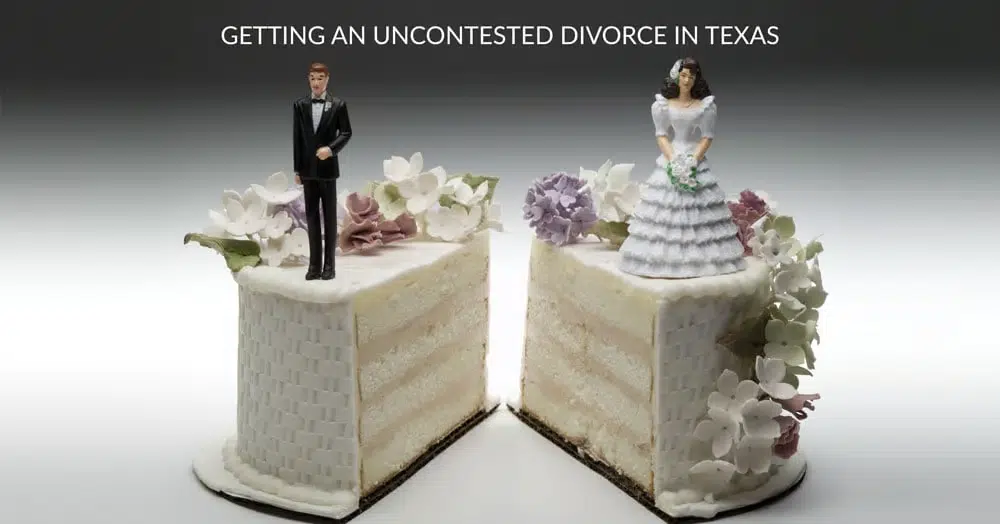
Contested and Uncontested Divorces in Texas
Divorce in Texas: Contested vs. Uncontested Divorces
Divorce can range from a long, drawn-out process to an amicable resolution for marital problems that cannot be solved. Divorces falls into one of two categories: contested and uncontested divorces. A contested divorce occurs when the parties cannot agree to the same terms regarding property division, assets, child custody, child support, and debt allocation, among other things. An uncontested divorce is when a couple agrees on all the issues needed to end their marriage, including property and asset division.
In Texas, obtaining a divorce can follow two distinct paths: contested or uncontested. Each type of divorce carries its own procedures, costs, and emotional tolls on the parties involved. Understanding the differences between these two paths is crucial for anyone navigating a divorce in the state.
Uncontested Divorce
An uncontested divorce, often considered the simpler and more amicable route, occurs when both spouses agree on all major aspects of the divorce, including asset division, debt responsibility, child custody, and support arrangements. This agreement is often formalized in a written document and submitted to the court for approval. The key advantage of an uncontested divorce is that it typically requires less time and money since there is no need for prolonged legal battles or court hearings.The process begins when one spouse files a petition for divorce with the court, stating that both parties have reached an agreement. Since there is no dispute to resolve, these divorces can sometimes be finalized shortly after the mandatory waiting period of 60 days in Texas, assuming all legal documents are correctly prepared and submitted.
Contested Divorce
Conversely, a contested divorce occurs when spouses cannot agree on one or more key issues. This type of divorce is more complex and can become highly contentious. The process involves each spouse presenting their case, often through their respective attorneys, and a court making decisions on their behalf. Issues commonly contested include child custody, division of assets and debts, alimony, and child support.The steps in a contested divorce are more involved. It begins with one spouse filing a petition for divorce, followed by the other spouse being served and given a chance to respond. If the spouses still cannot reach an agreement through negotiation or mediation, the case will proceed to trial, where a judge will make the final decisions. This process can take many months or even years, depending on the complexity of the issues and the court’s schedule.
| Aspect | Contested Divorce | Uncontested Divorce |
|---|---|---|
| Definition | A divorce where the spouses disagree on one or more key issues such as alimony, child custody, or property division. | A divorce where both spouses agree on all major issues including alimony, child custody, and property division. |
| Process | Typically requires more legal proceedings including trials and hearings to resolve disputes. | Involves filing paperwork where both parties have mutually agreed upon the terms. |
| Time Frame | Generally takes longer, often several months to years, depending on the complexity of disputes and court schedules. | Can be quicker, sometimes resolved in as little as 61 days if there are no complications. |
| Cost | More expensive due to attorney fees, court costs, and the duration of legal proceedings. | Less costly as it often requires fewer attorney hours and minimal court fees. |
| Emotional Strain | Typically more stressful and emotionally taxing due to conflicts and prolonged court engagements. | Generally less stressful, as it involves cooperative negotiation and agreement. |
| Outcome | The court makes final decisions on unresolved matters after evaluating the presented arguments and evidence. | The spouses have control over the outcomes as they reach agreements without court intervention. |
Is there a minimum waiting period to get a divorce?
Yes. In Texas, most cases have a minimum of 60 days for a divorce to be finalized, but many cases take longer. After this period, you and your spouse appear before a family court and a judge finalizes your divorce.
Frequently Asked Questions about Contested vs. Uncontested Divorce
Here are some answers to frequently asked questions about contested and uncontested divorce.
How do you know if you can get an uncontested divorce?

In Texas, both partners need to not only agree to the divorce, but to other terms, including property division, child custody and visitation, debt division, and other matters. Your divorce is likely contested if either spouse is alleging a ground other than insupportability (a no-fault ground for divorce).
What are some benefits of getting an uncontested divorce?
Uncontested divorces are generally resolved outside of court, which helps keep fees down. Plus, staying out of court means you can dissolve the marriage more quickly and privately.
In an uncontested divorce, will a court have to intervene when children are involved?
For couples with children going through an uncontested divorce, it is not uncommon for the couple to go to court to settle child custody issues, as well as child support payments. One thing to keep in mind is that the court acts in the best interests of the child when deciding these matters. Unless a couple is able to solve all issues and come to an agreement, what starts out uncontested divorce often becomes contested because, particularly when children are involved, it can become difficult to settle everything fairly out of court.
Should you get an attorney when you have an uncontested divorce?
It’s a good idea to hire an attorney, even in cases of uncontested divorce. If your spouse has an attorney, you should hire one to make sure your interests are fairly represented. If you have kids, hiring an attorney can help you work out a better child custody agreement. Other issues, such as property division and redrafting a will may be at issue, so retaining an attorney can help you make sure your interests are not undermined. Keep in mind that the agreement you come to at the end of your divorce regarding property division is final 30 days after the judge presiding over your case signs your divorce decree. If you find a mistake in the property division agreement or find another issue, you have to file a motion for a new trial or a modification of the divorce decree. However, you have to file this motion within 30 days of judge’s signing of your divorce decree or changes will not be allowed. Hiring an attorney can not only streamline the process for you and give you peace of mind but can help you get the agreement that is best for you.
Are there steps to an uncontested divorce?
Yes. First, you file an original petition for divorce with the District Clerk’s Office.
You must then give your spouse notice of the divorce. You can give notice in several ways, including serving them with divorce papers, providing a waiver of citation, or in some cases, by publication. When notice is served, your spouse must respond. Your spouse can file an answer or file their own court documents. Your spouse can also request a court hearing. After this, you have to wait 60 days, during which you can negotiate, mediate, and/or request temporary orders.
After the 60 days are up, you can schedule a final hearing for divorce which is presided over by a judge. Once the divorce decree is finalized, you must provide the order (or have the court do so) to your spouse.
![]()
Is there a process when it comes to a contested divorce?
There are steps almost everyone takes when it comes to a contested divorce. First, one spouse will file a petition which states the grounds you are alleging for divorce. In Texas, grounds for divorce include: insupportability, cruelty, adultery, felony conviction of your spouse, abandonment, living apart (three years or more), or confinement of a spouse to a mental hospital.
The other spouse then needs to respond to the divorce petition. If at this stage in the process if you have not hired an attorney, and especially if you are going through a contested divorce, you should hire an attorney.
Then, the attorney will review your case and go through the process of gathering information about the divorce, also called “discovery,” which includes collecting evidence and depositions. Next, you will go through pretrial motions (a phase of the process before trial) and court hearings.
Following the pretrial motion stage, any settlement proposals or other negotiations can be done. If no agreement can be reached, you proceed to trial. Generally, if the resolution of the case is not in your favor, you can appeal the court’s decision.

Uncontested Divorces Often Become Contested Divorces
Some divorces initially begin as uncontested but can evolve into contested divorces as the process unfolds. Here’s a look at how and why this shift can occur:
1. Discovery of New Information
- Financial Disclosures: One common reason for a divorce to shift from uncontested to contested is the discovery of previously undisclosed financial information. For instance, if one spouse discovers that the other has been hiding assets or debt, trust erodes and conflicts can arise.
- Misunderstandings: Sometimes, what was initially thought to be an agreement based on a misunderstanding can lead to disputes once clarifications are made.
2. Change in Circumstances
- Economic Changes: Changes in the financial circumstances of one or both parties, such as a job loss, promotion, or significant financial gains or losses, can alter expectations and needs, leading to disputes over financial support or division of property.
- Parental Responsibilities: Changes in circumstances affecting children, such as changing needs, preferences, or the relocation of a parent, can disrupt initial agreements on custody or visitation.
3. Emotional Dynamics
- Emotional Evolution: The emotional state of one or both spouses can change during the divorce process. For instance, as the reality of the divorce sets in, a spouse may feel more contentious or less willing to compromise.
- Influence from Others: Friends, family, or new romantic partners may influence one or both spouses’ perspectives on what is fair or desirable, leading to changes in previously agreed terms.
4. Complexity of Issues
- Underestimating Complexity: At the outset, some couples might underestimate the complexity of dividing assets, such as retirement accounts, real estate, or business interests. As they delve deeper, the complexities can lead to disagreements.
- Long-Term Implications: As discussions progress, the long-term implications of decisions, particularly those affecting children or financial stability, can become clearer, prompting a spouse to contest the terms.
As these issues come into play, the process can become more legally complicated and emotionally charged, shifting the divorce from a seemingly straightforward uncontested case to a complex contested one. It’s important for individuals going through a divorce to seek appropriate legal and emotional support to navigate these changes effectively.
What should you remember?
Divorce gets complicated. What starts as an uncontested divorce can become a contested divorce, particularly when children or property division are involved. If your spouse retains an attorney or your divorce is contested, you should hire an attorney to represent your interests as fairly as possible.
Considering a Divorce? Contact Us
Do you have questions about contested and uncontested divorce? If so, call us at (817) 900-3220.
To learn more about divorces in Texas, visit our Divorce page.




